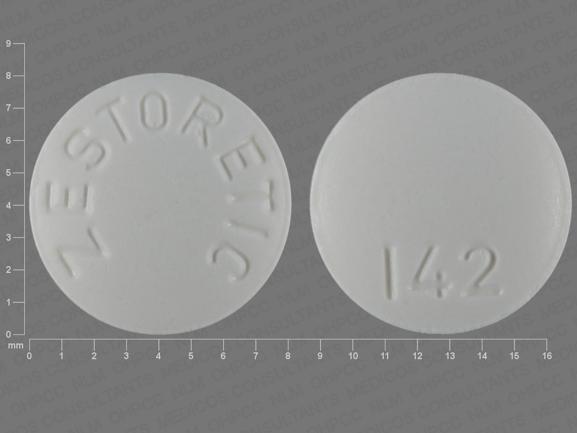Zestoretic Interactions
There are 615 drugs known to interact with Zestoretic (hydrochlorothiazide/lisinopril), along with 18 disease interactions, and 3 alcohol/food interactions. Of the total drug interactions, 54 are major, 506 are moderate, and 55 are minor.
- View all 615 medications that may interact with Zestoretic
- View Zestoretic alcohol/food interactions (3)
- View Zestoretic disease interactions (18)
Most frequently checked interactions
View interaction reports for Zestoretic (hydrochlorothiazide / lisinopril) and the medicines listed below.
- albuterol
- amlodipine
- aspirin
- atenolol
- atorvastatin
- Crestor (rosuvastatin)
- Cymbalta (duloxetine)
- Flexeril (cyclobenzaprine)
- gabapentin
- Lasix (furosemide)
- levothyroxine
- Lipitor (atorvastatin)
- lisinopril
- Lyrica (pregabalin)
- meloxicam
- metformin
- metoprolol
- Neurontin (gabapentin)
- Norco (acetaminophen / hydrocodone)
- Norvasc (amlodipine)
- omeprazole
- prednisone
- simvastatin
- Singulair (montelukast)
- Synthroid (levothyroxine)
- tramadol
- Vitamin D3 (cholecalciferol)
- Xanax (alprazolam)
- Zocor (simvastatin)
- Zoloft (sertraline)
Zestoretic alcohol/food interactions
There are 3 alcohol/food interactions with Zestoretic (hydrochlorothiazide / lisinopril).
Zestoretic disease interactions
There are 18 disease interactions with Zestoretic (hydrochlorothiazide / lisinopril) which include:
- angioedema
- bone marrow suppression
- hemodialysis
- hyperkalemia
- hypotension
- anuria
- electrolyte losses
- liver disease
- lupus erythematosus
- renal function disorders
- liver disease
- renal dysfunction
- asthma
- diabetes
- hyperlipidemia
- hyperparathyroidism
- hyperuricemia
- thyroid function tests
More about Zestoretic (hydrochlorothiazide / lisinopril)
- Zestoretic consumer information
- Compare alternatives
- Pricing & coupons
- Reviews (5)
- Drug images
- Side effects
- Dosage information
- During pregnancy
- Generic availability
- Drug class: ACE inhibitors with thiazides
- En español
Related treatment guides
Drug Interaction Classification
| Highly clinically significant. Avoid combinations; the risk of the interaction outweighs the benefit. | |
| Moderately clinically significant. Usually avoid combinations; use it only under special circumstances. | |
| Minimally clinically significant. Minimize risk; assess risk and consider an alternative drug, take steps to circumvent the interaction risk and/or institute a monitoring plan. | |
| No interaction information available. |
See also:
Further information
Always consult your healthcare provider to ensure the information displayed on this page applies to your personal circumstances.


